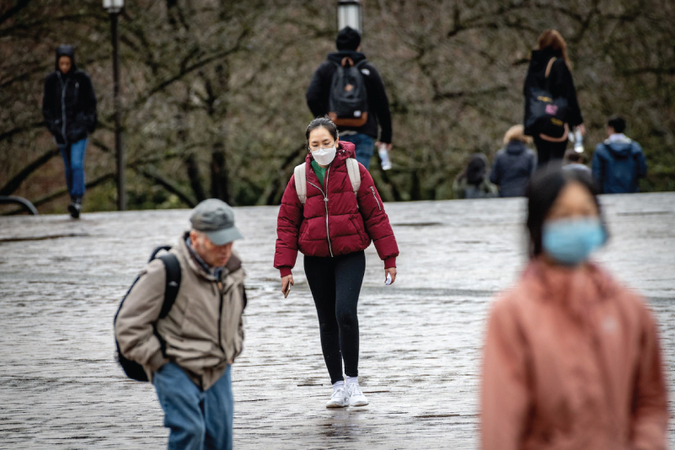Coronavirus has made already-stressed college students even more anxious and depressed, study finds

During spring break, when college students' stress levels typically falls and sleep levels increase, rates of depression and anxiety soared, researchers said after monitoring behaviors among young people during the onset of the novel coronavirus pandemic.
After tracking the moods and movements of about 200 Dartmouth College students for more than two years, the researchers noted that the public health crisis had spurred higher-than-normal stress levels and bouts of sedentary behavior - an average of 21 hours per day - suggesting students followed social distancing orders and avoided traveling during the initial outbreak of covid-19, the disease caused by the coronavirus.
Jeremy Huckins, a lecturer on psychological and brain sciences, and Andrew Campbell, a researcher and computer science professor, are using an app called StudentLife to monitor students' locations, phone usage and travel patterns. This is the first time researchers have used sensor data from phones to gather behavioral insights into the way students reacted to the public health crisis, said Campbell, who helped develop the app.
"It sort of sits in the background quietly," Campbell said of StudentLife. "We can analyze those locations to look at how many places the student visits per day, every day. We can look at phone usage, so how much a student is using their phone. Like, unlocking their phone, for example."
Researchers also use StudentLife to issue weekly surveys and gauge students' moods and stress levels. Self-reported symptoms of anxiety and depression spiked in March, when students were asked to leave campuses and finish their courses online, Huckins said.
Students around that time were also preparing for final exams, already one of the most stressful times during any term. They were adjusting to shelter-in-place policies and coping with social isolation when researchers noticed a marked increase in stress levels.
Researchers noted students were anxious and depressed around spring break, when stress levels typically drop and sleep levels increase, Campbell said.
"We didn't see that at all during spring break because most of them had to go back home," he added. The campus had shuttered to slow the spread of covid-19.
And when students went home, they stayed there during the first few weeks of the pandemic.
"Many people wouldn't expect college students to listen to social distancing orders, but these students did," Huckins said. "We found that when social distancing was recommended by local governments, students were more sedentary and visited fewer locations on any given day."
The study, published last month in the Journal of Medical Internet Research, suggests the impact of the coronavirus reaches beyond physical health and safety. More Americans are dealing with the mental health effects of spending more time indoors, away from loved ones and, in many cases, unemployed, experts say. But mental illness has long been a pressing concern for college students: More than 40 percent have felt "so depressed that it was difficult to function," according to a 2019 report from the American College Health Association.
Advocates worry students will struggle to get help as their mental health continues to deteriorate. After students left campuses last semester for their homes in other states, many schools scaled back clinical therapy services. A patchwork of licensure laws that, in many cases prevent psychologists from practicing across state lines, made therapy inaccessible for thousands of students.
Campus health centers have been offering group counseling sessions on Zoom and wellness webinars to fill in the gaps, particularly for students who cannot access therapy at home. But even with students heading back to campuses in the fall, the way care is delivered will likely look very different from a year ago.
Huckins and Campbell are still analyzing data recorded during the final weeks of the school year, which will provide insight into the way students adjusted to remote learning. Preliminary data show students also experienced higher-than-normal levels of anxiety and depression through the summer.
But researchers still don't know how students will be affected long term.
"An unresolved question is if mental health and physical activity will continue to degrade over time, or if we will see a recovery, and how long that recovery will take," Huckins said.
